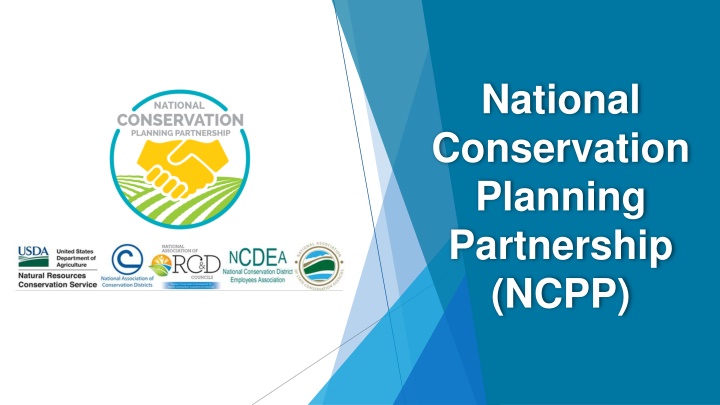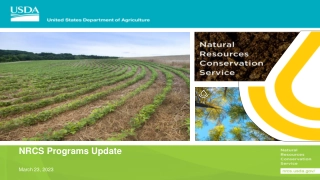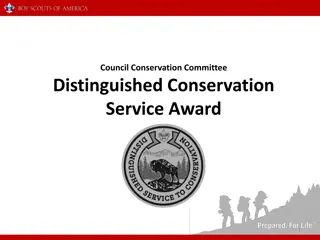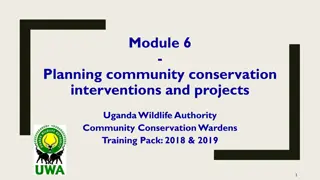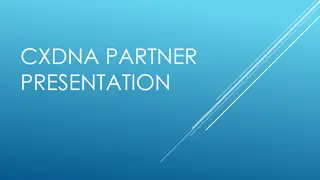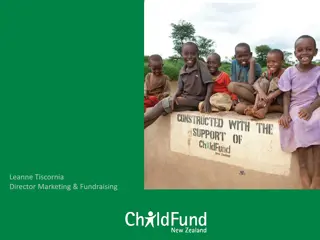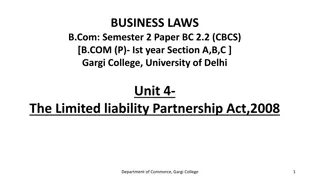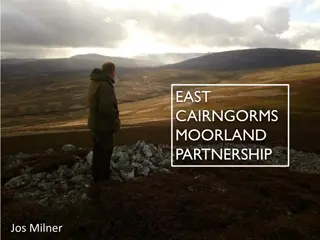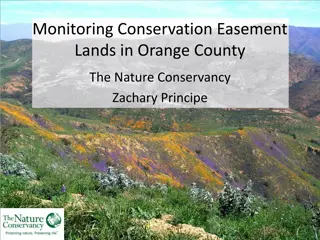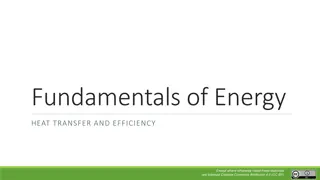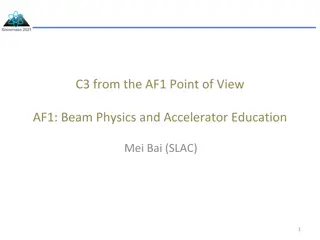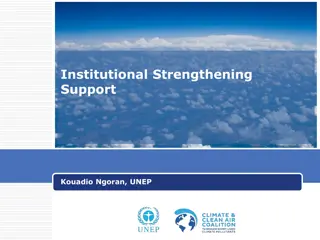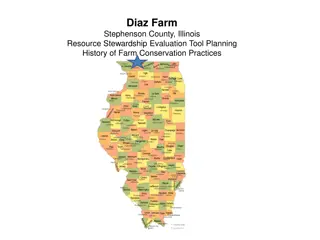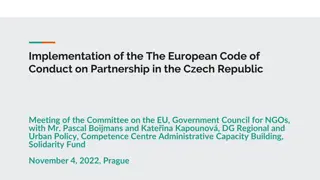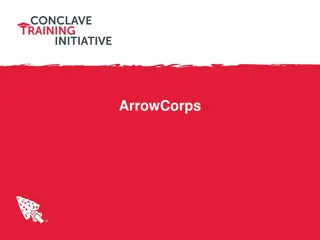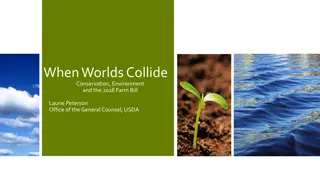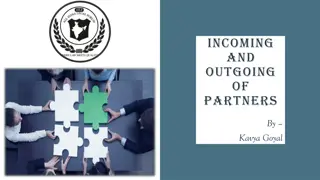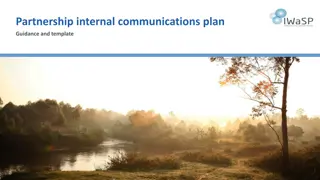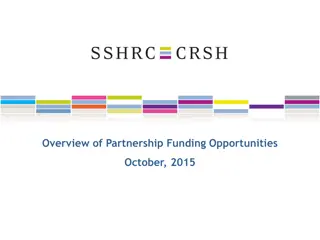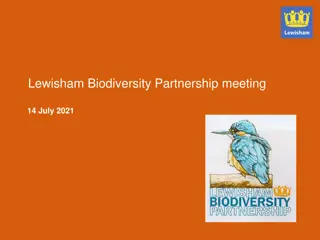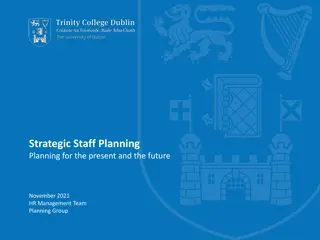National Conservation Planning Partnership (NCPP) - Reinvigorating Conservation Planning
The National Conservation Planning Partnership (NCPP) is a collaboration among five key national conservation partners to enhance and revitalize conservation planning efforts. The partnership aims to strengthen the planning process and workforce to deliver improved conservation assistance. Through goals like reinvigorating conservation planning, nurturing a skilled workforce, and fostering science-based assistance, the NCPP strives to elevate conservation practices. Additionally, through listening sessions held in various states, the partnership gathered valuable feedback and suggestions to further enhance conservation initiatives.
Download Presentation

Please find below an Image/Link to download the presentation.
The content on the website is provided AS IS for your information and personal use only. It may not be sold, licensed, or shared on other websites without obtaining consent from the author.If you encounter any issues during the download, it is possible that the publisher has removed the file from their server.
You are allowed to download the files provided on this website for personal or commercial use, subject to the condition that they are used lawfully. All files are the property of their respective owners.
The content on the website is provided AS IS for your information and personal use only. It may not be sold, licensed, or shared on other websites without obtaining consent from the author.
E N D
Presentation Transcript
National Conservation Planning Partnership (NCPP)
What is NCPP? The National Conservation Planning Partnership (NCPP) represents the efforts of five key national conservation partners to reinvigorate conservation planning.
NCPP Partners Natural Resources Conservation Service (NRCS) National Association of Conservation Districts (NACD) National Association of State Conservation Agencies (NASCA) National Conservation District Employees Association (NCDEA) National Association of Resource Conservation and Development Councils (NARC&DC)
NCPPs Purpose To reinvigorate conservation planning by enhancing and strengthening the planning process and our partnership workforce.
NCPP Goals Reinvigorate conservation planning Improve the partnership s capacity to deliver one-on-one conservation planning assistance as well as at all scales Ensure the delivery of voluntary, science- based assistance Build and sustain a workforce of strong conservation planners across the partnership
What Does NCPP Mean For The Partnership? Highly skilled and trained workforce Development of new tools and technology Ability to provide improved customer service An enhanced, united workforce for conservation The delivery of voluntary, science-based technical assistance
2018 Listening Sessions Eight Listening Sessions have been completed in the following states: Indiana Minnesota Texas Washington State New York Nebraska North Carolina Wyoming The purpose of the listening sessions was to share in- depth details on the status of conservation planning and its future and to hear feedback from all.
What Was Achieved 1. 201 individual items of feedback, suggestions from 8 Listening Sessions 2. NRCS employees, partnership employees, state conservation partnership leaders, conservation district supervisors, volunteers, and agricultural producers participated 3. Over 1,035 participants (in-person and on- line) 4. Feedback was received verbally, written and electronically
Summary of Recommendations Communications. Use clear and consistent messaging and guidance to improve internal communications. Apply transparent, common-sense methodologies that are customer friendly. Develop and support business tools that can be tailored to the locally established customer priorities. This in addition to a simplified access point, will reduce duplication and increase engagement to allow for expansion of technology that will improve the conservation planning process and address natural resource concerns. Streamlining of current program policy to increase workload efficiencies. Review and update policy to ensure ranking criteria is consistent with statutory requirements established for financial assistance programs. Improve the internal processes for programmatic decisions to increase program efficiency and quality assurance with the certainty our customers deserve and respect.
Summary of Recommendations Training. Expand the training options for delivering national, regional and state based training that will provide more realistic levels of training needed for NCPP employees and other participants, to ensure that we are able to address the producers needs. Field employees receive clear messaging of benefits of conservation planning implementation. Use Conservation Effects Assessment Project (CEAP) or other modeling methods to communicate and quantify benefits and outcomes to help customers (internal and external alike) better understand the effectiveness of conservation practices. This in addition to a simplified planning process will increase customer engagement and allow for the continuous adoption of a conservation plan.
Communications Hugh Hammond Bennett (HHB) Awards The National Conservation Planning Partnership (NCPP) established the Hugh Hammond Bennett (HHB) Award for Conservation Excellence in 2017. This award recognizes both producers and conservation planners from within the NCPP partnership who have exemplified outstanding service through development and implementation of sound conservation planning and other conservation techniques. One national winner in each category producer and conservation planner is chosen each year and recognized at the National Association of Conservation Districts (NACD) annual meeting. NCPP is requesting that every state conservation partnership participates by selecting a state HHB Award winner in each category producer and conservation planner. This may be as simple as nominating the winner of your existing state-level conservation district award such as Cooperator of the Year, Farmer of the Year, etc. Also, some states have established Conservation Planner of the Year or Conservationist of the Year awards for recognizing their employees which may be compatible with the criteria for the planner award. To submit a nomination please follow this link: 2021 Hugh Hammond Bennett Award for Conservation Excellence Nomination Form - Formstack . Note: You may save the nomination and come back to it at any time by hitting 'save and resume. All nominations must be completed and submitted by October 1st. Link to NCPP website: HHB Award Eligibility | National Conservation Planning Partnership If you have any questions or concerns, please contact coordinator@ncpp.info
Communications NCPP Website and GovDelivery Newsletters NCPP launched our website in 2019. Visit National Conservation Planning Partnership to view conservation planning resources, learn more about NCPP efforts and sign up to receive direct updates. Monthly Newsletters through GovDelivery Relevant Information and Timely Updates Technical Guidance and Information Employee Spotlights Action Team Accomplishments Upcoming Training Sessions and Webinars Suggestions and Feedback to improve the conservation planning process We re always open to new ideas to improve conservation planning!
CONSERVATION PLANNING POLICY REVISIONS The NRCS Conservation Planning Policy (General Manual 180, Part 409) was revised again in 2019. This minor revision incorporated language to allow for automated resource assessment and updated a couple of courses for conservation planner designation. Changes include: Modified paragraph 409.1 E A conservation plan is a record of the client s decisions and supporting information for treatment of a unit of land for one or more identified natural resource concerns as a result of the planning process. The plan describes the schedule of implementation for practices and activities needed to address identified natural resource concerns and takes advantage of opportunities. The needs of the client, the resources, and Federal, State, Tribal, and local requirements will be met. Added paragraph 409.1 G A nationally supported tool that automates and streamlines the resource concern assessment process (e.g. Conservation Assessment Ranking Tool or Conservation Desktop) can be used to document meeting FOTG planning criteria for conservation program planning purposes. Although an automated assessment tool may not directly rely on the assessment methodology identified in the planning criteria, it utilizes similar inputs to provide thresholds to document whether planning criteria have been achieved. 409.9 D (3) i and ii - Due to new AgLearn courses being developed, added AgLearn to the options for taking the following training and removed on the job training as an option. Using Basic Soil Survey Information in Conservation Planning. Fundamentals of highly erodible land (HEL) and wetland conservation (WC) provisions training
National Planning Procedures Handbook (NPPH) Revision The NPPH is the handbook used by conservation planners that describes the NRCS conservation planning process and procedures. NPPH Amendment 7 was posted in January 2020 and included many major changes, such as changes to land use designations and modifiers, conservation plan requirements, definitions, and several figures and exhibits were removed if outdated or didn t significantly clarify handbook content.
Tools Implemented Document Management System, to streamline financial assistance contracts. Developed National Conservation Planner Database containing 6,400 planners, including 1,200 partners. Completed roll-out and expansion of the Conservation Client Gateway. Updated Customer Service Toolkit to increase user productivity. Completed testing of Conservation Desktop with over 100 tester including partners. Appointed POCs for each state for Conservation Desktop activities. Delivered a nationwide integrated CDSI training to staff and partners. Completed roll-out of Conservation Desktop-Release 1 and trained 175 people as trainers.
Training Hosted Conservation Boot Camp training for more than 112 District and 150 NRCS employees. Reduced costs by promoting state-led or regionally customizing Conservation Boot Camp training. Updated Conservation Planner Policy 2019. Developed web-based trainings and alternatives for conservation planner trainings. Provided guidance on approval of state sponsored courses and equivalent courses for soil health. Issued National Instructions for providing partner access to AgLearn. Hosted workshops to assist states with updating state supplements. Executed agreements to improve training deliver and access. The team developed and reviewed training slated for February 11-12, 2021 and June 22nd and 24th of 2021
Partnership Survey A conservation planning producer survey was conducted to obtain feedback on specific ways to improve the format, usefulness and value of a conservation plan and improve the delivery of conservation planning assistance. Letters were sent to partner leaders to distribute to amplify responses for the survey. Analysis of the survey results occurred between February - May of 2021. Preliminary results are available on the NCPP website. However, we are waiting on FPAC s Customer Experience Survey to complete the project.
State Conservation Plans In February 2021, State Conservation Partnership Leaders participated in a two-day training and briefing session on the National Conservation Planning Partnership (NCPP) state plans. A request was made for each state conservation partnership to assess their situation and develop a preliminary plan by April to strengthen conservation planning. Templates and suggestions were offered as tools to consider and will allow for each state to address their unique situation, while fine tuning what is most needed, using suggested templates or additional formats that work best in each respective state. The NCPP teams have been in contact with the states to provide feedback to state leaders as they finalize their plans.
Next Steps Expansion of tools and resources to increase employee s knowledge, skills and abilities Continue implementation of the new Conservation Planning Certification Policy and Procedures. Ensure Flexibility is used. Convert the Economics of Conservation Planning training to an online format. September 16thmemo. Enter into more agreements with professional organizations to increase availability of specialized continuing ed courses. Expand NCPP database to include a geospatial mapping tool and portal to allow states to enter and manage data effectively. Branding NCPP and use of the website to issue all communications across the partnership.
Thank You! USDA and its partners are equal opportunity providers, employers and lenders.
